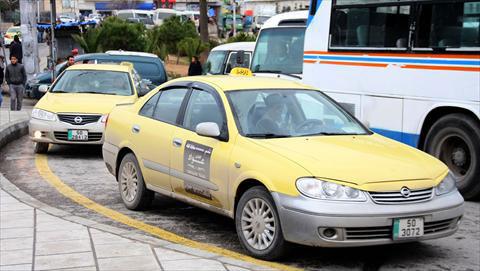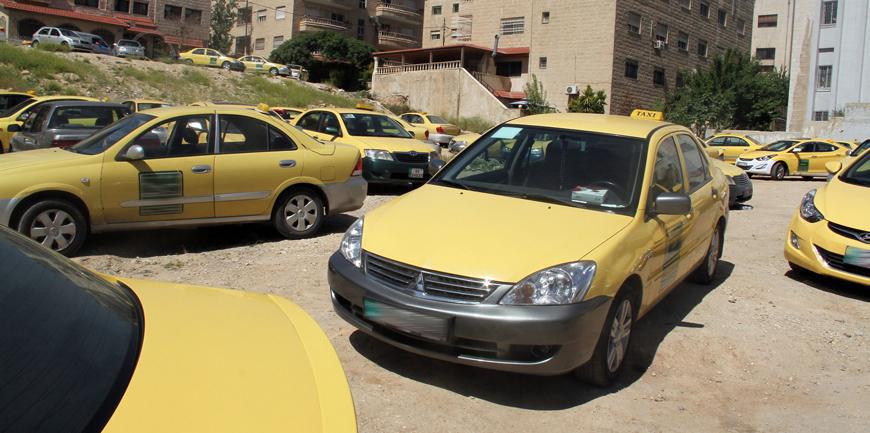You are here
Taxi drivers protest gov’t approval of ride-hailing apps
By Hana Namrouqa - Dec 26,2017 - Last updated at Dec 26,2017

Taxi drivers complained that they are in an ‘unfair competition’ with drivers of private cars, objecting that ride-hailing apps, such as Uber and Careem, should only be allowed for yellow taxis (Photo by Amjad Ghsoun)
AMMAN — Taxi drivers on Tuesday rejected the government’s decision approving a regulation that allows the licensing of ride-hailing apps.
Taxi drivers complained that they are in an “unfair competition” with drivers of private cars, objecting that ride-hailing apps, such as Uber and Careem, should only be allowed for yellow taxis.
“More and more people in Amman and across the country are choosing private transit over yellow cabs since ride-hailing apps started in Jordan. I am seeing less passengers since such apps were introduced and my daily income is decreasing,” Abu Kamal, a 55-year-old taxi driver, said.
Abu Kamal said that he does not object ride-hailing apps, but noted that they should be only exclusive to yellow cabs.
“I am with technological development, even in my sector, but I call on the government to rethink its decision and withdraw its decision allowing private cars to transport people, which will put many of us out of business,” Abu Kamal, who has been a taxi driver for more than a decade, said.
Hassan Abu Rabeh, another taxi driver, said that allowing the licensing of ride-haling apps “can never be fair to yellow cab drivers”.
“How can this be fair to us as taxi drivers when we pay more than JD50,000 to have a licence. How can this be fair to us when transporting people is our main job while it is in many cases a part-time job for drivers of private cars under ride-hailing apps,” Abu Rabeh, who pays daily JD25 in rent for the yellow cab, told The Jordan Times.
Ahmad Abu Haidar, president of the Transport Services and Taxi Owners Union, said that the union will announce its stance on the government’s decision when it receives an official copy of the regulations, which the Cabinet approved in its session on Sunday.
“We are in communications with the Ministry of Transport and the Greater Amman Municipality… over the new regulations. We demanded a copy of the new regulations to study before we announce any statement,” Abu Haidar told The Jordan Times on Tuesday.
There are around 12,000 yellow cabs in Amman that serve more than 3.5 million residents.
According to the 2010 Public Transport Law, it is mandatory to obtain a special licence to operate a public transport vehicle.
In Jordan, it is not allowed for private cars to provide transportation services, including Uber and Careem. Many drivers have been detained and their cars impounded as authorities cracked down on the service.
The new regulation, which seeks to improve the level of transport, bans ride-hailing apps from operating in Jordan unless their companies obtain licences from the Land Transport Regulatory Commission and a registration certificate from the Companies Control Department.
Many people welcomed the government’s decision allowing ride-hailing apps in Jordan, saying that the step will “make people’s everyday-life easier”.
“It is great news to know that the government is allowing the licensing of such apps because I personally rely on them in most of my trips whether to see friends or do shopping,” Rana Rashed, a banker, said.
Inas Odeh said that licensing ride-hailing apps will help “even better the service”.
“My teenage boy now uses such apps when he goes out with his friends. I feel a lot safer knowing that operating companies will be registered and official,” Odeh, a mother of three, said.
Related Articles
AMMAN — Prices of yellow taxis have dropped 30 per cent over the course of the year due to competition in the sector, according to the vice
AMMAN — Owners of thousands of yellow taxis will file lawsuits against ride-hailing app companies and authorities, demanding compensation fo
AMMAN — Drivers of yellow taxis on Tuesday held protests across Amman, demanding an increase in fares and to reserve the use of ride-hailing


















